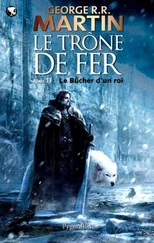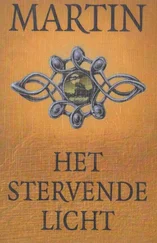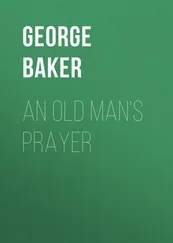At midday, I saw the first outpost of the Tribes: a squat tower made of blackened stone. This was not something that they had originally built but a remnant of some long-gone people that they had taken over, perhaps once a military fortification, perhaps a temple of some kind. It could have been either, and it was impossible to tell—whatever sense of the practical or the numinous that it had once possessed was also long gone, leaving it a gloomy shell. But there were signs of a recent fire scorching the stone of its floor and witch-marks daubed in soot around the walls. I smiled when I saw them, because I was one of the ones whom the marks were intended to deter, but they held no trace of power, not this far west. It was only when you reached the inner desert that the sand-singers knew what they were doing; these marks would have been made by a warrior, superstitious, and thus afraid. Something clattered high in the roof, and, outside, the mount gave a rumbling bellow. A bird, nothing more, one of the leather-winged shrikes that haunted the mountains. I went outside again and looked down the valley. There was the bird, a low shadow shooting over the grass.
It was too early to camp in the tower, so I set off once more, heading through a stand of desert birch whose bare trunks arched out of the soil like golden bones. It was as the mount was traversing its thickest point that I heard a distant cry, borne on the wind. I steered the tope to the edge of the little wood and looked down. The wood stood high on a ridge of rock, looking out onto the plain, and, against the pale grass, I saw again the man on the black tope, but this time I could see that he wore the emblem of a tribe upon his hat and that he had a pursuer.
The pursuer rode a green beast, one of the burrow-dwelling things that live in the hills of Ithness, and it was therefore a long way from home. Part reptile, part cat, it leaped along sinuously, and I could see its rider casting the malefic incantations that the sorcerers of Ithness are wont to employ, hurling poisons like bolts. I grinned. I should not get involved, and yet—well, I knew Ithness all too well, had danced for a time in their slave palaces, and for Cadrada itself I had a score to settle. Besides, bestowing an unlikely favor is never a bad thing. I kicked the mount forward and rode down onto the plain.
As I neared the two figures, I could taste the incantations on the air. It is said that in Ithness, sorcerers imbibe magic with their poisons, so that they emit wrongness whenever they utter words, and the air was bitter in his wake. I recognized those incantations, and the man behind them. I notched a barb into the nozzle of the gun and took aim, firing through a lace of salt-alder on the banks of a brackish rivulet. I watched with satisfaction as the sorcerer threw up his arms and toppled sideways from his mount. The green beast shrieked and ran. The man on the black-furred tope reined it in and hailed me, but I was already turning my mount, fleeing back up the slope, and was gone.
Cadrada, sometime before, and a girl was dancing. There was a blue-green fire in the center of the hall, and far below the city, the plains jackals were barking out their territorial boundaries. The girl danced to the beat of their song and her eyes caught the light like a forest fire. I watched her from the back of the hall and thought of the night before, when she had danced for me alone. Her name was Hafyre, and I was not the only one watching.
The sorcerer sat on a dais, cross-legged beside our host, one of the lords of Cadrada, a man named Halse, who had a jackal as his totem. Appropriately. Occasionally, I saw the sorcerer lean over to whisper to him, and the lord’s cold, jaded face betrayed a flicker of interest. I noted that the sorcerer was typical of his kind: parchment skin and a yellowing rattail of hair, bound with a spiral of bone. The people of Ithness are always too pale, like mushrooms. His sleeves jingled with warding charms, and when he reached out a hand for his wineglass, I saw that it was tattooed with the sigil of his personal demon.
Later, looking for Hafyre, I saw the sorcerer again in the maze of corridors that led from the hall. He snapped his fingers and a spark of a spell arced through the air. Hafyre came meekly out of the shadows, took his sigil-decked hand, and followed him into the night. I did not think that the spell had much to do with it, however I might have liked to believe otherwise. That was Hafyre: She liked to circle herself with power and was not choosy about how she achieved it.
Then she had gone missing. No one knew where. Halse was predictably angry and had the slavemaster thrown off the battlements. He was not, it seemed, so jaded after all. He hired me to find her and bring her back. I did not know if he knew about Hafyre and myself, or if he would have cared. He knew me beneath the mask as Zuneida Peace, and men do not take women’s affairs seriously, or, if they do, are intrigued rather than angered. And I was little more than just another servant for hire, after all.
Hafyre’s trail, such as it was, led to Scarlight, and thus had brought me north. Now the pallid sorcerer was here, as well. And so, it seemed, was Nightwall Dair.
I left the plain far behind, and by dusk was deep into the mountains. The walls rose ahead of me, tower upon tower of shadow. When it grew too dark to see, I dismounted, lit a fire, and camped for the night. I slept, but with the strange dreams that I remembered from earlier times here, tormenting images of leatherblack wings and a girl’s face, seen through fire.
When I woke, I lay blinking at the stars. I knew who that girl in the dream was, of course: Hafyre, my quarry. Her eyes glowed forest-green, her skin was golden, and her hair a brown-red, like soil. She smiled, turned her head, and beckoned, and, in imagination, I saw her move sinuously in the firelight. She wore the costume of a slave-girl, her bare torso striped with a hundred shifting bands of emeralds and her tunic trousers the color of leaves in spring. Desire flickered deep within me. She was all the shades of the world, but she was gone, fleeing with the morning, and soon I rode on.
By now, I had expected to see signs of the Tribes, and that I had not done so concerned me. It was cold, but I would not yet have expected them to retreat into their mountain fastnesses, the secret places that made the more credulous folk claim that they were nothing more than ghosts. Toward the middle of the afternoon, however, I came across more tracks, then, in the distance, a cluster of the round grey tents that the Tribes use in summer, sprouting like toadstools on a plateau of dead grass. Their mounts grazed nearby, and I saw the red-and-azure banner of the Ynar flying on a pole. I released a breath of relief: These were the most civilized, if you like, of the Tribes—they do not, at least, shoot on first sight. And they were also the ones I was looking for. I approached warily all the same.
When I was a short distance away, the priestess came out of a tent with a flail in her hand. She was not young, her skin scarred and splattered with indigo patterning. I saw the spike through her lower lip that told me she was a deathspeaker, and her headdress jingled with the beads of her wealth. She did not look pleased to see me.
“Shan-hai,” I greeted her with her title, “I come with a message. From Cadrada.”
“I know no one and nothing in the cities,” the priestess snapped. “Do not lie.”
“I’m telling you the truth.” I dismounted and threw the scrap of fabric with the emblem of the Ynar upon it, above the personal totem. Her breath hissed in her throat as she saw it, and she snatched it from the ground as though I were going to steal it back.
“Where did you get this?”
“Give me water and I’ll tell you. I cut it from no corpse, if that is what you’re asking.”
Читать дальше












